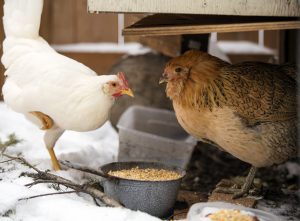Welcome to Part 3 of the Winter Chickens Series!
We are now several months into our winter chicken raising experience and loving it even more. My girls are almost fully grown and are slowly integrating with my main flock. They still live in their own chicken coop, but we do plan to move them to the main chicken coop later this summer.
What I most love about these winter chickens, is that they should start laying eggs pretty soon! Most chickens will lay their first egg between 16 and 24 weeks of age. My winter chickens arrived in late January and mid-February, so they are now between 13 and 15 weeks old, fully feathered and living their best lives outside!

There’s certainly nothing wrong with getting chickens in mid to late spring, but those chickens won’t start laying until late summer to early fall. I’m really looking forward to finding my first eggs from my winter chicks in the next few weeks! So early egg production is a clear benefit to winter chickens.
However, as we are all well aware now after 2020 and February 2021, sometimes things go very wrong. Chicks are especially susceptible to cold temperatures caused by power outages or shipping delays, so here are a few tips and tricks to help you keep your winter chickens warm when things don’t go the way they should.
How to tell if your chicks are too cold
If your chicks are too cold, they will start to huddle all together. They will also get very quiet and won’t be chirping normally. Their heads may start to droop, and they might start to pant.
How to keep your chicks warm without electricity
- Always pick mail order chicks up as early as you can so that if they were stunned by cold temperatures during the mailing process, you can get them under heat as quickly as possible. Bring a few warm water bottles with you to the post office so you can get some heat on them right away. Have electrolytes ready and give them warm water to drink to help them get warm.
- If you lose power at home and are worried about keeping your chicks warm, move your brooder box to the warmest location in your house. Do you have a fireplace or wood stove? Put them near it. You can also put warm water bottles in their brooder, if you can. Another way to help keep them warm is to make the brooder smaller. Smaller areas will stay warmer than larger areas. You can add extra bedding, cut up pieces of foam insulation, and also use them to cover their brooder area to keep in the heat.
- Feeding them warm food is a great way to help chicks stay warm too. Give them a little warm mush or warm scrambled eggs to help them. Even very young baby chicks should be able to eat these warm foods to keep their body temperature up.